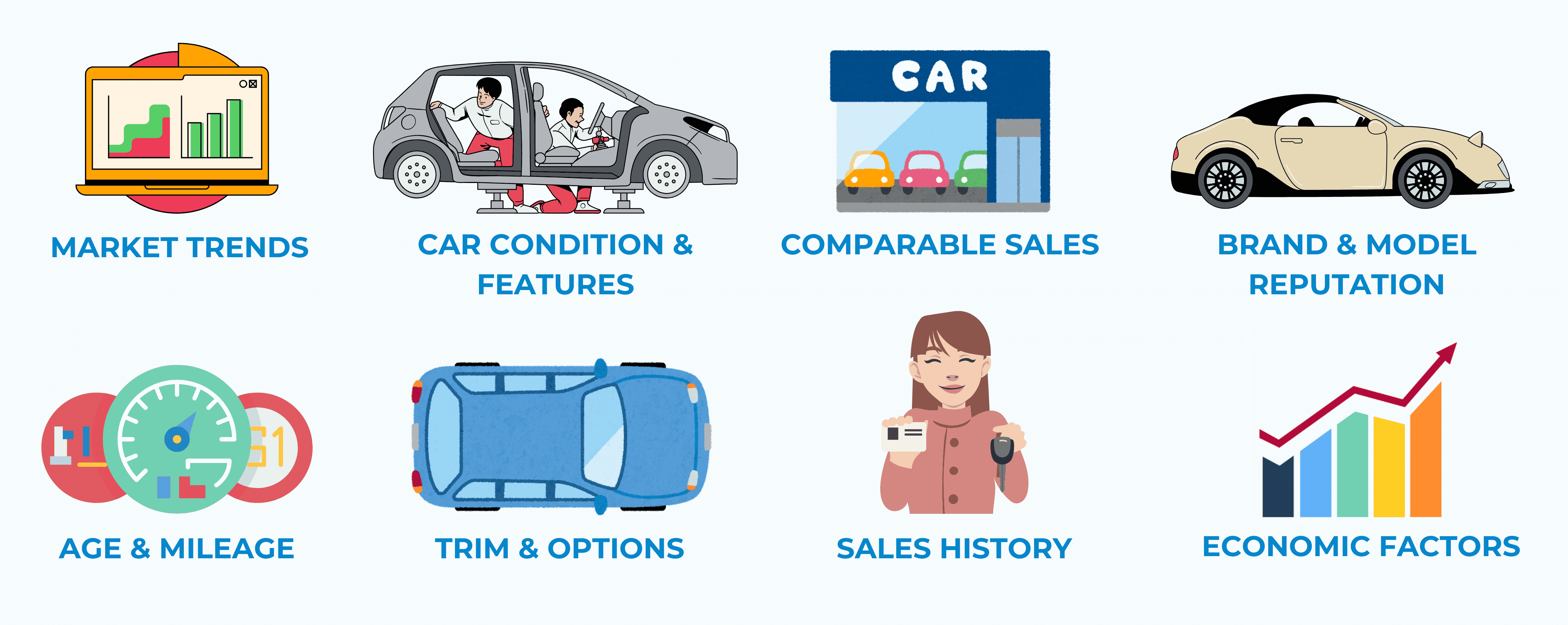
Ever wondered why your brand-new car isn’t worth as much the moment you drive it off the lot? That’s car depreciation and value in action. Car depreciation is the steady decline in a vehicle’s value over time, and it happens faster than most people realize. In fact, some cars lose up to 20% of their value within the first year! Want to know exactly how much your car is worth? Use a NADA car value by VIN lookup to get an accurate estimate!
Whether you’re buying, selling, or trading in a vehicle, understanding depreciation can help you make smarter financial decisions and even minimize your losses. Let’s break it down so you know what to expect and how to stay ahead of the game.
How Depreciation Impacts Car Value
Car depreciation plays a major role in your vehicle’s resale value. Some models hold their value better than others, and several car resale value factors determine how quickly cars lose value. The impact of depreciation varies depending on multiple factors.
| Age of the Car | Cars lose the most value in the first few years—some drop by 30% in just the first year! (Source: U.S. News & World Report) |
| Mileage | More miles mean more wear and tear, which lowers resale value. |
| Condition | A well-maintained car is worth more than one with mechanical problems or cosmetic damage. |
| Market Demand | Popular models keep their value longer than less desirable ones. |
| Brand & Model | Some brands like Toyota and Honda hold their value better than others. High-end luxury cars usually depreciate faster than economy models. (Source: Investopedia) |
| Accident History | Even if repairs were made, a car with a crash history usually loses value faster. That’s why sellers should leverage VIN insights to maximize value when selling their used cars. |
| Multiple Owners | Cars with multiple past owners tend to depreciate more quickly. |
| Color | Common colors like white, black, and silver usually hold value better than unique shades. |
| Trim Level & Features | Higher trims and premium features (like leather seats or safety tech) help maintain value. |
| Fuel Efficiency | Cars with good gas mileage tend to lose value more slowly, especially when fuel prices are high. |
| Tech & Updates | Outdated technology can make a car lose value faster compared to newer models with modern features. |
| Economic Conditions | Inflation, interest rates, and the overall economy can impact depreciation. A bad economy usually means used car values drop faster.l |
| EVs & Hybrids | Electric and hybrid cars depreciate differently, depending on battery improvements and government incentives. |
These car resale value factors are crucial when buying or selling a vehicle. Knowing them can help you make better decisions and ensure you’re getting the most value out of your car.
Learn more about how depreciation affects car value here.
How to Calculate Car Depreciation and Value
Various tools can provide an accurate assessment of a car’s depreciation. Many car depreciation calculators consider key factors such as:

- Market trends – The car’s value depends on supply and demand, the economy, and gas prices.
- Car condition & features – Things like mileage, accident history, maintenance, and extra features affect depreciation.
- Comparable sales – Checking similar models on the market helps figure out a fair price.
- Brand & model reputation – Reliable, in-demand cars hold their value better.
- Age & mileage – Higher mileage means faster depreciation, and new cars drop in value the most in their first few years.
- Trim & options – Premium trims, advanced safety features, and tech add to resale value.
- Sales history – A one-owner car is usually worth more than one with multiple past owners.
- Economic factors – Inflation, interest rates, and gas prices can all affect how quickly a car loses value.
A car depreciation calculator can help estimate how much value a vehicle has lost since it was purchased. Popular resources for checking car depreciation include NADA and KBB.
Why Understanding Depreciation Matters
Knowing your car’s depreciation rate is beneficial for several reasons:
Buying a Car
Some cars hold their value better than others. Picking one with a lower depreciation rate means you’ll get more money back when you sell it later. Understanding the impact of depreciation helps you make a smarter purchasing decision.
Selling or Trading In
If your car doesn’t lose value too fast, you’ll get a better price when it’s time to sell or trade it in. Keeping it in good shape helps, too!
Insurance Considerations
Your car’s value affects insurance rates and payouts. Knowing its depreciation can help ylou avoid overpaying or getting a low claim payout after an accident. (See: Why Accurate Car Value Matters for Insurance Claims)
Loan-to-Value Ratio
Depreciation affects how much you owe compared to what your car is worth. If it drops fast, you might end up owing more than the car’s value, which isn’t ideal.
Maintenance and Repairs
If your car is losing value quickly, dumping money into repairs might not be worth it. Sometimes, upgrading to a newer model is the smarter move.
Tax Deductions
If you use your car for business, depreciation can be a tax write-off. Different methods exist, so check what works best for your situation.
Resale Timing
Cars lose the most value in their first few years. If you wait until depreciation slows down, you could sell for a better price.
Depreciation Trends by Brand
Some brands hold their value better than others. Luxury cars tend to lose value fast, while reliable brands usually retain more over time. These are important car resale value factors to consider when evaluating a vehicle.
Market Demand
Cars that don’t depreciate as much are usually more popular in the used market. That means they’re easier to sell and hold better trade-in value.
Gap Insurance Needs
If your car’s value drops quickly, gap insurance can protect you from owing more than it’s worth if it gets totaled. This is important if you financed your car with a small down payment.
Electric vs. Gas Vehicles
EVs and gas cars depreciate differently. EVs may lose value faster due to battery concerns, but incentives and lower running costs help balance things out.
How VinCheck.info Can Help You
Unlike standard depreciation calculators, VinCheck.info car value by VIN offers valuable insights into car depreciation and value. That way, you can make smarter decisions when buying or selling.
- Title History – Verify past title records and ensure the vehicle has a clean title.
- Basic Manufacturer Information – Learn key details about the vehicle’s make, model, and origin.
- Vehicle Specifications – Access factory specifications, including engine size, transmission type, and more.
- Auto Warranty – Check if the vehicle is still under the manufacturer’s warranty or eligible for extended coverage.
- Insurance – Get insights into insurance costs and potential coverage options.
- Sales Timeline – Track the vehicle’s history of sales and ownership changes.
- Market Value – Determine the car’s current worth based on up-to-date market data.
- Ownership Cost – Evaluate total ownership expenses, including maintenance, repairs, and insurance.
- Recalls and Defects – Identify manufacturer recalls and common defects reported for the vehicle.
- Theft Incidents – Check if the vehicle has been reported stolen and recovered.
- Auto Insurance – Understand insurance implications based on the car’s history and risk factors.
- Liens – Find out if the vehicle has any outstanding loans or financial claims against it.
- Safety Ratings – Review crash test ratings and safety assessments from trusted organizations (e.g. NHTSA and IIHS)
Check Your Car Value Today!
Don’t let depreciation catch you off guard. Use the VinCheck.info car depreciation calculator now to get an accurate valuation and make informed decisions when buying or selling a vehicle.
Get the Best Car Deals Now! – Compare prices, check reliability, and avoid costly surprises.